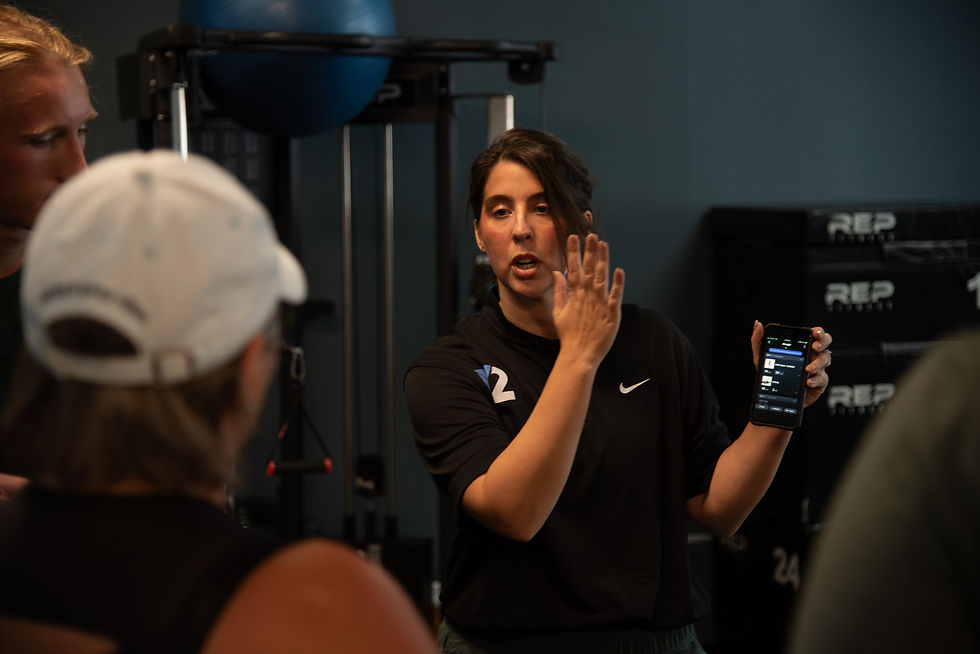What It Means to Be a Coach at M2
- DYLAN NOVAK

- Oct 29
- 3 min read
Updated: Oct 30
At M2, the title coach means something very specific. It’s not about cheerleading, running the clock, or calling out reps. It’s about leading people through a structured process of physical development with precision, intent, and care. Every M2 coach is part of a system designed to produce consistent, measurable progress across all clients.
When a client joins M2, they’re stepping into an environment built for growth. When a coach joins M2, they’re stepping into the responsibility of making that growth happen.

Coaching the M2 Way
Our system runs on structure, not guesswork. Each coach operates within a program that’s periodized, balanced, and tested for results. That structure allows the coach to focus on execution, communication, and adaptation.
Being an M2 coach means:
Understanding the “why” behind every movement pattern and training block
Delivering feedback that matters, not just noise or motivation
Watching how people move, not just what the numbers say
Adjusting on the fly while keeping the integrity of the program intact
You’re not just counting sets, you’re managing a dozen training variables simultaneously: movement quality, fatigue, intent, breathing, tempo, and positioning.
That’s coaching.
The Balance of Science and Connection
Every M2 coach is expected to know the technical side: biomechanics, progression models, and how to read adaptation trends. But technical skill is just half the job.
The other half is human connection.
We coach real people with busy lives, stress, and shifting priorities. The job isn’t just to make them stronger; it’s to make them believe that their strength is worth pursuing. The best coaches at M2 can hold the standard without breaking the relationship. They can demand excellence while still making the room feel like a team. Our culture is built on that balance.
Development Never Stops
M2 coaches are required to grow. Every month we meet as a staff to break down programming, biomechanics, and coaching strategy. These sessions aren’t box-checking; they’re practice.
We critique each other. We ask better questions. We refine the small things that make big differences: bar path, setup tension, cue timing, verbal tone.
Being a coach at M2 means you’re a student of your craft for as long as you’re here. The moment you stop learning, you fall behind.
Leadership by Example
The M2 coaching standard starts with how you train yourself. We don’t ask clients to do things we wouldn’t do. We expect every coach to model discipline, consistency, and intent.
Members notice how you move, how you prepare, and how you carry yourself on the floor. Coaching isn’t performance, it’s demonstration.
When clients see their coach training with focus, recovering intelligently, and showing up with purpose, that energy sets the tone for the entire session.
The Weight of the Role
Being a coach at M2 isn’t light work. You’re responsible for the outcomes of the people in your group, not just their results in the gym, but how they perceive training altogether.
You influence their habits, their confidence, and their long-term relationship with strength. That’s not a small thing.
So when we say coach, we mean someone who takes that responsibility seriously. Someone who wants to teach, refine, and lead others toward becoming stronger humans, physically and mentally.
In Short
To be a coach at M2 means to:
Think critically about training
Communicate clearly and with purpose
Hold the standard, for yourself and your group
Keep learning, always
Lead with integrity
We don’t chase trends. We build strength, systematically, intelligently, and relentlessly.
That’s what it means to be a coach at M2.




Comments